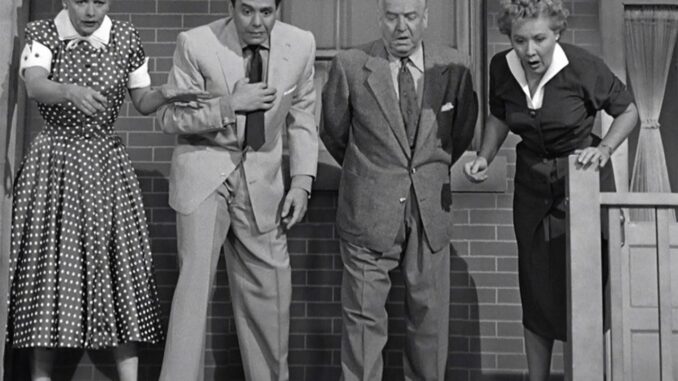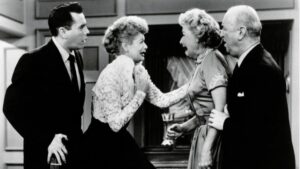
The Bold Confrontation: When ‘I Love Lucy’ Faced Antisemitism on Live TV
In the golden age of television, few shows were as beloved as I Love Lucy. Week after week, millions of Americans gathered around their TV sets to watch Lucille Ball, the redheaded comedian, light up the screen with her quirky charm. But one moment in the show’s history was much more than just comedic genius. It was a bold, daring move that tackled a sensitive issue—antisemitism—in front of a national audience. Let’s dive into that historic moment and explore how I Love Lucy made a significant impact that still resonates today.
A Nation Under One Show: The Influence of ‘I Love Lucy’
By the 1950s, I Love Lucy was a household name. The sitcom wasn’t just popular; it was a cultural phenomenon, with millions tuning in every week. Lucille Ball and Desi Arnaz (Lucy and Ricky) were more than just TV stars; they were pioneers of the medium, breaking ground in ways few others dared. The power of the show to address serious issues, even in subtle ways, was unmatched.
But did anyone expect that the show would confront antisemitism? Not likely. In an era where social issues were often avoided on TV, I Love Lucy took an unspoken stand, and it all happened so naturally that many viewers didn’t even realize they were witnessing history.
Setting the Stage: The Context of Antisemitism in 1950s America

To understand the significance of this moment, we first need to recognize the context. The 1950s were not as carefree as television might have portrayed. Beneath the surface, America was grappling with serious social issues. Racism, sexism, and antisemitism were all present, although rarely addressed in mainstream media.
At that time, Jewish communities faced discrimination in many areas of life, including housing, employment, and education. The rise of McCarthyism also fueled a climate of suspicion and prejudice, with many Jewish individuals targeted for supposed “un-American” activities. Despite the challenges, Jewish Americans contributed immensely to the entertainment industry, making the subtle stand by I Love Lucy even more significant.
The Episode That Sparked the Conversation
In the episode titled “The Passover,” I Love Lucy depicted a storyline involving Lucy’s next-door neighbors, the Mertzes—Fred and Ethel. Fred, who was often depicted as gruff but harmless, was at the center of a conversation that subtly tackled the issue of antisemitism.
During the episode, Fred made a stereotypical comment about a Jewish character, something that wasn’t unusual for the time. What was unusual, however, was the way the comment was addressed. Lucy, in her signature style, shut down Fred’s prejudice with humor and warmth, making it clear that such views were outdated and unacceptable.
Lucy’s Subtle Approach: Humor as a Tool for Change
Lucille Ball had a unique gift—she could tackle serious issues without alienating her audience. In the episode in question, the issue of antisemitism was not confronted with aggression or anger, but with Lucy’s trademark comedic touch. This allowed the message to resonate without making viewers uncomfortable or defensive.
By using humor, the show challenged stereotypes in a way that didn’t feel preachy or forced. Instead, it encouraged the audience to laugh at the absurdity of prejudice, prompting a subtle but powerful shift in perception.
The Power of Television in Addressing Social Issues
This moment on I Love Lucy was groundbreaking not just because of what was said, but because of where it was said—on television, a medium that reached millions of Americans. TV had the power to shape public opinion, and by addressing antisemitism in such a casual, everyday way, I Love Lucy played a role in normalizing conversations around prejudice.
Breaking Barriers: Lucille Ball and Desi Arnaz’s Legacy
It’s worth noting that I Love Lucy was a show that broke barriers in more ways than one. Lucille Ball, a woman in the male-dominated world of television, was a force to be reckoned with. Her husband and co-star, Desi Arnaz, was a Cuban immigrant, and their portrayal of an interracial marriage on screen was revolutionary in its own right.
By featuring an interracial couple at the forefront of American television, I Love Lucy quietly pushed back against the norms of the time, challenging viewers to rethink their assumptions about race, ethnicity, and identity.
The Aftermath: Did Viewers Notice?
You might be wondering—did anyone notice the episode’s subtle message against antisemitism? While it didn’t spark public outrage or massive discussion, it did plant seeds in the minds of viewers. The show was so beloved that audiences likely saw the humor first, but the underlying message couldn’t be ignored.
Sometimes, the most effective messages are those that are slipped into our everyday lives. I Love Lucy mastered this technique, addressing serious topics without making them the focal point of the show. This approach allowed audiences to laugh, reflect, and—perhaps without even realizing it—begin to change their attitudes.
Why This Moment Still Matters Today
Fast forward to today, and the issues I Love Lucy quietly addressed are still relevant. Antisemitism, unfortunately, persists in various forms, both in the U.S. and around the world. The power of television to challenge prejudice remains, though fewer shows today take the kind of risks I Love Lucy did.
In a time when media often focuses on division, it’s worth remembering the way this iconic show used humor to unite people and confront hatred, all while making audiences laugh.
A Lasting Impact on Television
Lucille Ball’s work set the stage for future shows to address social issues. Though many remember I Love Lucy for its slapstick humor and hilarious misunderstandings, its lasting legacy includes its quiet courage in confronting bigotry.
What We Can Learn from ‘I Love Lucy’ Today
The episode’s handling of antisemitism offers a valuable lesson—sometimes the best way to challenge hatred is to make it look ridiculous. By laughing at prejudice, we strip it of its power. In today’s world, where social media amplifies messages of both unity and division, there’s a lot we can learn from Lucy’s approach.
Conclusion: The Quiet Courage of ‘I Love Lucy’
Though it might not have seemed like a revolution at the time, I Love Lucy’s confrontation with antisemitism was a powerful moment in television history. The show used humor to tackle difficult issues, influencing how millions of Americans thought about prejudice. As we look back on that time, we can appreciate the subtle yet significant role the show played in promoting tolerance and understanding.